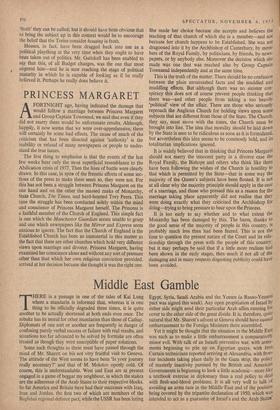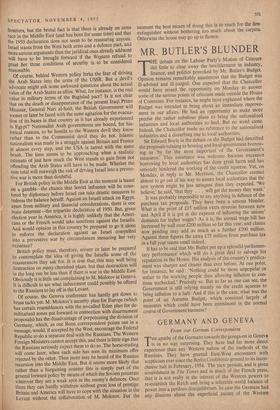Middle East Gamble
THERE is a passage in one of the tales of Kai Lung where a mandarin is informed that, whereas it is one thing to be officially degraded three times, it is quite another to be actually shortened at both ends even once. The rebuke has its moral for other mandarins than those of Cathay. Diplomats of one sort or another are frequently in danger of confusing purely verbal success or failure with real results, and situations too far advanced to be solved by formula are often treated as though they were susceptible of paper solutions.
Some such thoughts as these must have passed through the mind of Mr. Sharett on his not very fruitful visit to Geneva. The attitude of the West seems to have been `Is your journey really necessary?' and that of M. Molotov openly cold. Of course, this is understandable. West and East are at present engaged in a game of beggar my neighbour. in which the stakes are the adherence of the Arab States to their respective blocks. So far America and Britain have had their successes with Iraq, Iran and Jordan, the first two of which are members of the Baghdad regional defence pact, while the USSR has been luring Egypt, Syria. Saudi Arabia and the Yemen (a Russo-Yemeni pact was signed this week). Any open propitiation of Israel by either side.might send their particular Arab allies running for cover to the other side of the great divide. It is, therefore, quite natural that Mr. Sharett's advent at Geneva should have caused embarrassment to the Foreign Ministers there assembled. Yet it might be thought that the situation in the Middle East was such as to make a little embarrassment a comparatively minor evil. With talk of an Israeli preventive war, with arma- ments beginning to pile up on Egyptian quays, with Iron Curtain technicians reported arriving at Alexandria, with fron- tier incidents taking place daily in the Gaza strip, the policy of masterly inactivity pursued by the British and American Governments is beginning to look a little academic—more like a textbook exercise in diplomacy than a real policy to deal with flesh-and-blood problems. It is all very well to talk of avoiding an arms race in the. Middle East and of the position being covered by the tripartite declaration of 1950, which was intended to act as a guarantee of Israel's and the Arab States' frontiers, but the brutal fact is that there is already an arms race in the Middle East (and has been for some time) and that the 1950 declaration does not seem to be reassuring anyone. Israel wants from the West both arms and a defence pact, and more serious arguments than the juridical ones already adduced will have to be brought forward if the Western refusal to grant her these conditions of security is to be considered reasonable.
Of course, behind Western policy lurks the fear of driving the Arab States into the arms of the USSR. But a devil's advocate might ask some awkward questions about the actual value of the Arab States as allies. What, for instance, is the real value in military terms of the Baghdad pact? Is it not clear that on the death or disappearance of the present Iraqi Prime Minister, General Nuri al-Said, the British Government will sooner or later be faced with the same agitation for the evacua- tion of its bases in that country as it has already experienced In Egypt? Nationalist Arab governments are bound, for his- torical reasons, to- be hostile to the Western devil they know rather than to the Communist devil they do not. Islamic nationalism was made in a struggle against Britain and France at almost every step, and the USA is tarred with the same brush. The time seems to be approaching when a realistic estimate of just how much the West stands to gain from not offending the Arab States will have to be made. Whether the sum total will outweigh the risk of driving Israel into a preven- tive war is more than doubtful.
For British policy in the Middle East at the moment is based on a gamble—the chance that Soviet influence will be coun- tered by diplomacy before Israel can take drastic measures to redress the balance herself: Against an Israeli attack on Egypt. apart from military and financial considerations, there is one main deterrent—the tripartite declaration of 1950. But, given election year in America, it is highly unlikely that the Ameri- cans or the French would take sanctions against the Israelis. And would opinion in this country be prepared to go it alone to enforce the declaration against an Israel compelled into a preventive war by circumstances menacing her very existence?
British policy must, therefore, sooner or later be prepared to contemplate the idea of giving the Israelis some of the reassurances they ask for. It is true that, this may well bring destruction on many cherished plans, but that destruction will in the long run be less than if there is war in the Middle East. Obviously it is little use complaining to M. Molotov at Geneva. It is difficult to see what inducement could possibly be offered to the Russians to lay off in the Levant.
Of course, the Geneva conference has hardly got down to brass tacks yet. M. Molotov's security plan for Europe (which has certain resemblances with the so-called Eden plan for de- militarised zones put forward in connection with disarmament proposals) has the disadvantage of perpetuating the division of Germany, which, as our Bonn correspondent points out in a message, would, if accepted by the West, encourage the Federal Republic to do a separate deal with the Russians. The Western Foreign Ministers cannot accept this, and there is little sign that the Russians seriously expect them to do so. The horse-trading will come later, when each side has seen its minimum offer rejected by the other. Then more may be heard of the Russian incursion into the Middle East. But it seems more likely that rather than a bargaining counter this is simply part of the general forward policy by means of which the Soviets penetrate wherever they see a weak spot in the enemy's defences. Once there they can hardly withdraw without great loss of prestige. Britain and America will have to cope with the situation in the Levant without the collaboration of M. Molotov. For the moment the best means of doing this is to reach for the fire- extinguisher without bothering too much about the carpets. Otherwise the house may go up in flames.











































 Previous page
Previous page